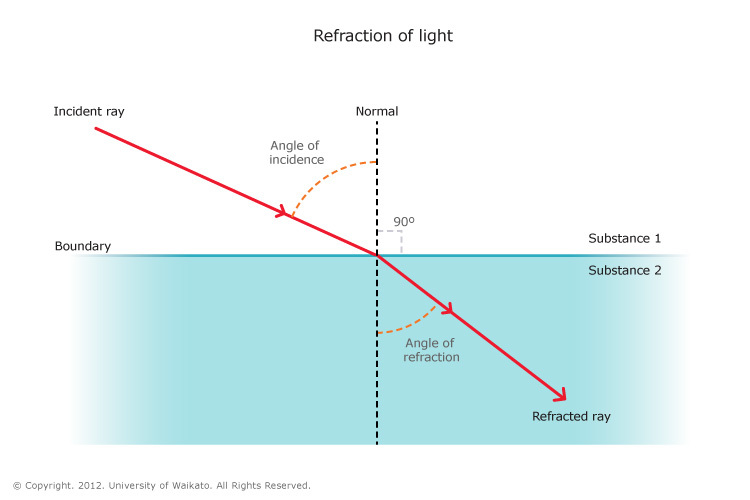
noun
- Physics. the change of direction of a ray of light, sound, heat, or the like, in passing obliquely from one medium into another in which its wave velocity is different.
- Ophthalmology.
- the ability of the eye to refract light that enters it so as to form an image on the retina.
- the determining of the refractive condition of the eye.
- Astronomy.
- Also called astronomical refraction.the amount, in angular measure, by which the altitude of a celestial body is increased by the refraction of its light in the earth’s atmosphere, being zero at the zenith and a maximum at the horizon.
- the observed altered location, as seen from the earth, of another planet or the like due to diffraction by the atmosphere.
noun
- physics the change in direction of a propagating wave, such as light or sound, in passing from one medium to another in which it has a different velocity
- the amount by which a wave is refracted
- the ability of the eye to refract light
- the determination of the refractive condition of the eye
- astronomy the apparent elevation in position of a celestial body resulting from the refraction of light by the earth’s atmosphere
1570s, from Late Latin refractionem (nominative refractio) “a breaking up,” noun of action from past participle stem of Latin refringere “to break up,” from re- “back” (see re-) + comb. form of frangere “to break” (see fraction).
n.
- The turning or bending of any wave, such as a light or sound wave, when it passes from one medium into another of different density.
- The ability of the eye to bend light so that an image is focused on the retina.
- Determination of the refractive characteristics of the eye and often the correction of refractive defects with lenses.refringence
- The bending of a wave, such as a light or sound wave, as it passes from one medium to another medium of different density. The change in the angle of propagation depends on the difference between the index of refraction of the original medium and the medium entered by the wave, as well as on the frequency of the wave. Compare reflection. See also lens wave.
- The apparent change in position of a celestial body caused by the bending of light as it enters the Earth’s atmosphere.
A change of direction that light undergoes when it enters a medium with a different density from the one through which it has been traveling — for example, when, after moving through air, it passes through a prism. (Compare reflection.)
 Liberal Dictionary English Dictionary
Liberal Dictionary English Dictionary